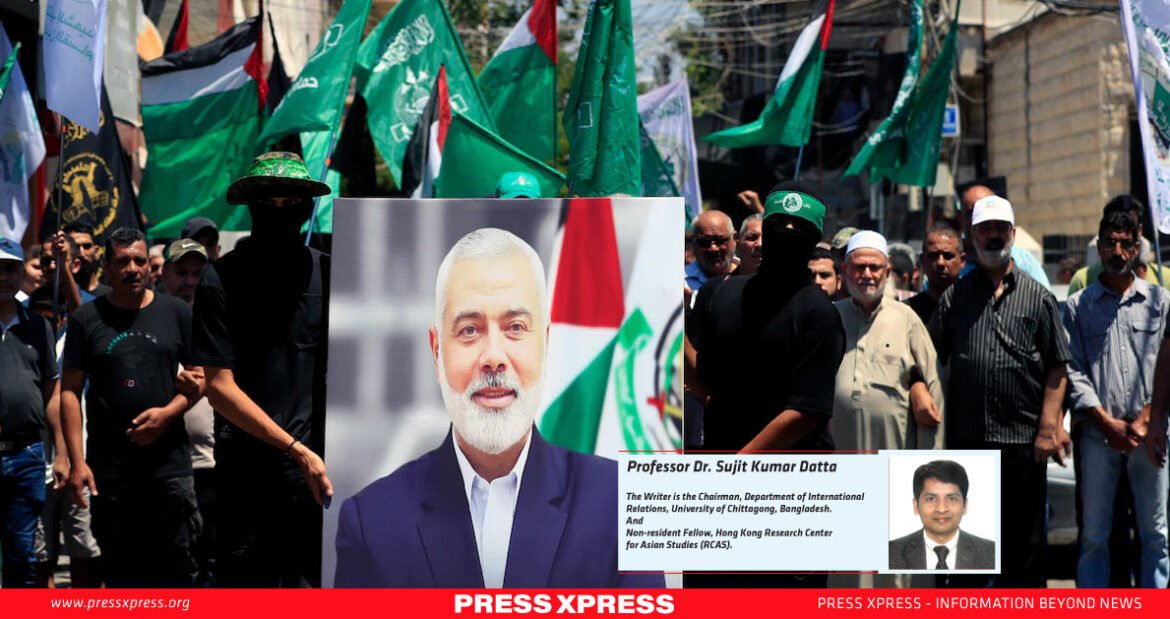The death of Hamas leader Ismail Haniyeh has created a new spark in Tehran that has given a new dimension to the Middle East conflict. Haniyeh’s death marks the loss of one of the most influential leaders of the Palestinian resistance, raising fears of instability and violence in the region. Iran’s Revolutionary Guards have issued a stern warning to Israel, which is responsible for the incident, and the death of Hamas leader Ismail Haniyeh has sparked renewed tensions. Israeli Prime Minister Benjamin Netanyahu has warned that anyone who attacks Israel will ‘pay a heavy price.’ The statement underscored the hardline stance of the Israeli leadership, raising fears of a wider regional war in the region. The UN Security Council will meet today at 4 pm (Wednesday, New York time) to discuss the situation in the Middle East as tensions in the region continue. Khalil al-Hayya, the deputy chief of Hamas in Gaza, said that Hamas and Iran do not want a regional war, but a crime has been committed that should be punished. The statement made it clear that Hamas and Iran do not like direct conflict but will maintain their tough stance on Israel. An Israeli government spokesman said Israel has so far not commented on Haniyeh’s death, a reflection of the Israeli leadership’s strategic silence. Iran’s Supreme Leader Ayatollah Ali Khamenei said it was “Tehran’s duty” to avenge Haniyeh’s killing because it happened in the Iranian capital. The statement sparked outrage among Iranians and fueled public opinion for retaliation against Israel.
You Can Also Read: Is Hamas Chief’s Death a Strategic Move by Israel?
Senior Hamas official Musa Abu Marzouk said Haniyeh’s death was a cowardly act that would face punishment. It signals Hamas’ tough stance and vows to retaliate. US Secretary of State Anthony Blinken said the US was not involved or aware of Haniyeh’s murder. Blinken’s statement could be seen as an attempt to maintain US neutrality and distance from Israeli activities. Mohammed Ali al-Houthi, head of Yemen’s Houthi Supreme Revolutionary Committee, called Haniyeh’s killing a “heinous terrorist crime.” The statement clarified Yemen’s position and reiterated its support for Iran and Hamas. Palestinian President Mahmoud Abbas strongly condemned the killing and expressed fear of renewed clashes between Palestinians. Qatar’s foreign ministry called the killing a “heinous crime” and a “shameful killing.” Egypt said the Israeli tensions signaled Israel’s lack of political will following the killing of Haniyeh in Tehran. China’s foreign ministry said the incident could lead to further regional instability. Under these circumstances, efforts to establish peace in the Middle East have become more difficult.
The subsequent reaction and counter-reaction to Haniyeh’s assassination could spark new tensions in Middle East politics. The prospect of renewed mobilization among Palestinians in particular, and the prospect of a harsh Israeli response, are raising fears of more bloody clashes in the region. The situation in the Middle East is becoming more volatile than ever. The potential for this new conflict and violence will not be limited to Israel and the Palestinians but may threaten the stability and security of the entire Middle East. This new challenge for the international community must be met through proper diplomatic efforts and peace-building initiatives. Resolving this tense situation in the Middle East requires consensus and cooperation from all parties. If not, the killing of Haniyeh could be the beginning of a new bloody conflict in the Middle East, which will affect the peace and stability of the region in the long run. Ismail Haniyeh’s death has sparked new Middle East tensions in Tehran. Overcoming this situation requires concerted efforts by the regional and international communities. Otherwise, new conflicts and violence will escalate in the region, which could endanger the peace and stability of the entire Middle East.
Haniyeh’s assassination has sparked a new crisis in the Middle East. Both Iran and Hamas reacted strongly to the killing. Hamas deputy chief Khalil al-Hayya said Hamas and Iran do not want a regional war, but the killing should be punished. Iran’s Supreme Leader Ayatollah Ali Khamenei said it was Tehran’s duty to avenge Haniyeh’s killing because it happened in Iran’s capital. Senior Hamas official Musa Abu Marzouk said Haniyeh’s death was a cowardly act that would face punishment. China’s foreign ministry said the incident could lead to further regional instability. Threats of retaliation by Iran and Hamas and Israel’s strong response are seen as significant threats to peace and stability in the Middle East. Analysts say the killing could trigger a major conflict in the Middle East that could pose a severe threat to international security. The assassination of Ismail Haniyeh has created a new crisis in the Middle East. Tensions between the regional and global communities have risen since the incident. Hamas and Iran have vowed revenge for Haniyeh’s death, which could escalate the conflict with Israel. The international community should take swift action to resolve this crisis to maintain stability in the Middle East.


